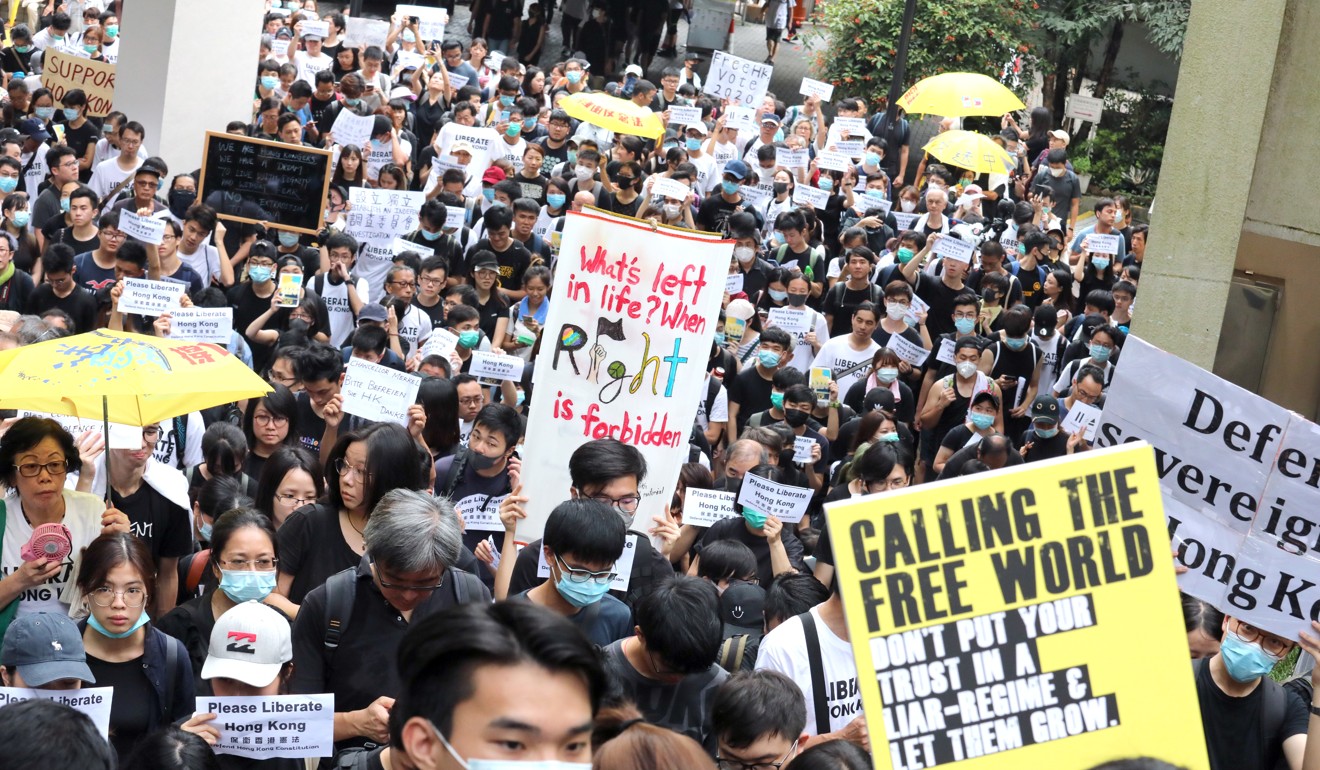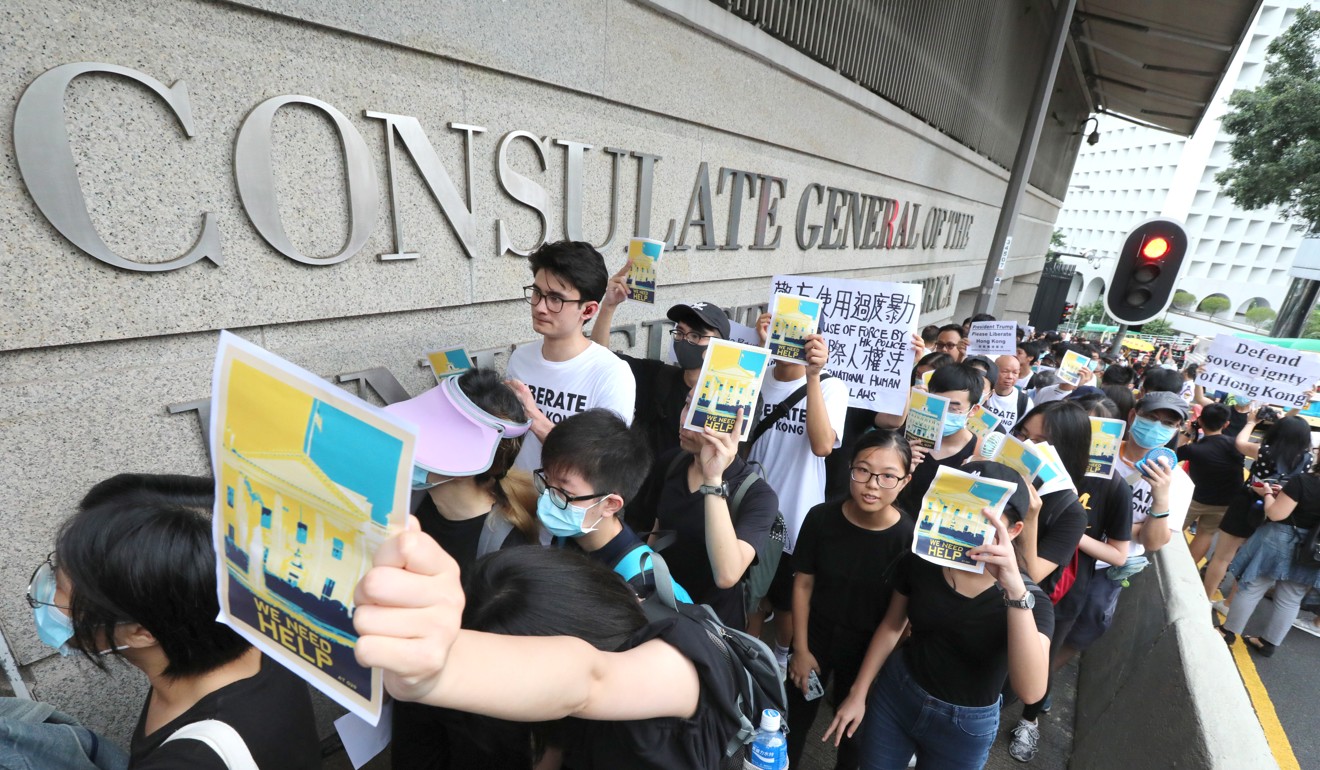
Extradition bill protesters hold ‘marathon petition’, calling at Hong Kong consulates of G20 nations, ahead of Osaka summit
- About 1,500 people, split up into three groups, deliver petitions to diplomatic missions across city
- Protesters aim to raise international attention for extradition bill saga, having also crowdfunded advertisements in international press
Organisers said about 1,500 people turned out, from different age groups and mostly dressed in black. They gathered at Chater Garden in Central before 9am, following an action plan that had been floated online for three days.
About HK$6.7 million (US$858,000) was raised in 11 hours on Tuesday by more than 22,000 people on a crowdfunding platform to run advertisements in foreign newspapers in a bid to take the protesters’ case to the international community.
According to organisers of the fundraising campaign, advertisements will be run in the Financial Times, The New York Times and at least 10 other newspapers in Europe, Asia, Australia and North America in the coming days.
They also wanted Lam to respond to three other demands: exonerate those previously arrested; retract all references to the protest on June 12 as a “riot”; and order an independent inquiry into the clashes that day.

The protesters called at the consulate of the US and the European Union’s local office in Central, as well as the British consulate in Admiralty, before 11am.
They split into several groups to petition 16 other consulates. One of the groups visited seven consulates in Central and Admiralty, including those of Canada, Germany and Japan; while the other two visited a total of nine in Wan Chai and Causeway Bay, such as those of Australia, Russia and Indonesia. They completed their march at about 2pm.
At the British and German consulates, the protesters’ petition was received by deputy head of mission Esther Blythe and deputy consul general David Schmidt respectively.
Harvey Sernovitz, spokesman for the US consulate general; Jolita Pons, head of the political, press and information section of the EU Office; and consuls from the Canadian, Japanese, Mexican, Australian and South Korean consulates also received the petitions.
But most of the other consulates only sent staff members to take the letter, while the Indonesian consulate was closed.
Although China is also a member of the G20, the protesters have no plans to petition Beijing’s liaison office in Western District or the office of the foreign ministry’s commissioner in Admiralty.
Ventus Lau Wing-hong, one of the organisers of the petition, announced through a portable loudspeaker that all three groups had received letters of no objection from police, which would be valid till 5pm.
“We had to bring it to the international level because the Hong Kong government has been ignoring our demands,” Lau said.
He added that this would be the first time so many Hong Kong citizens had called to diplomatic representatives in Hong Kong for a single cause.

Protester Leung hei-man, a film producer in his 40s, said he hoped that by visiting consulates, news of Hong Kong’s anti-extradition protests might make headlines in countries around the world and put pressure on the Chinese government.
“We believe something should be achieved with the G20 Summit. I hope there’s international consent to support Hong Kong’s freedom and basic human rights,” he said.
Sam Chan, 35, who works in the catering industry, decided to join the protest as he was not on duty on Wednesday morning.
“I learned about this online and I think it’s important to let the world know what is happening in Hong Kong,” he said.
Chan insisted that the government must meet all four of the protesters’ demands.
“I don’t understand why the government can’t explicitly say the word ‘withdraw’ if it insists that suspension is no different from withdrawal,” Chan said.

Also in the crowd was Fai Tam, a driver in his 50s, who joined after finishing a night shift. He said he hoped that Hongkongers would treasure the opportunity of making themselves heard around the world when a great number of foreign media were watching their protests.
“We can’t allow the government to dismantle a firewall between us and mainland China,” Tam said.
The Civil Human Rights Front will also host the “G20 Free Hong Kong” rally at Edinburgh Place at 8pm on Wednesday, to take their case to the international community. The front is calling for Lam to respond to the four demands, and to step down.



